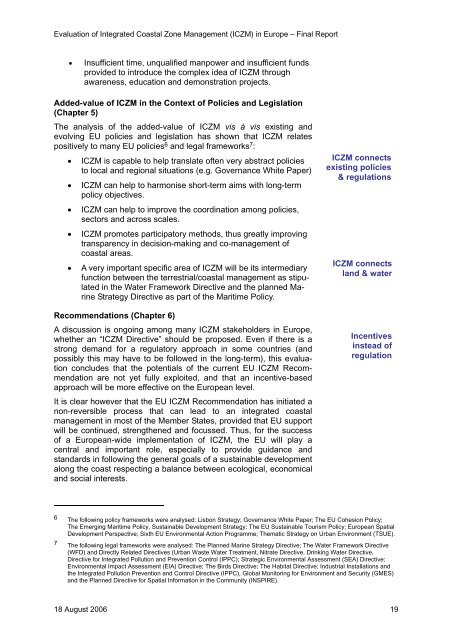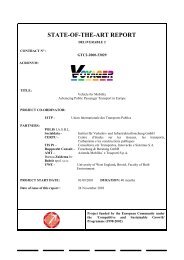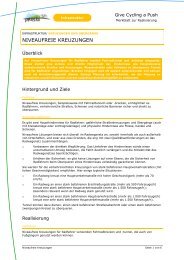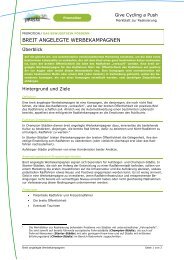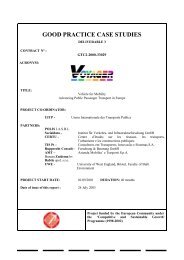Evaluation of Integrated Coastal Zone Management (ICZM) in ...
Evaluation of Integrated Coastal Zone Management (ICZM) in ...
Evaluation of Integrated Coastal Zone Management (ICZM) in ...
Create successful ePaper yourself
Turn your PDF publications into a flip-book with our unique Google optimized e-Paper software.
<strong>Evaluation</strong> <strong>of</strong> <strong>Integrated</strong> <strong>Coastal</strong> <strong>Zone</strong> <strong>Management</strong> (<strong>ICZM</strong>) <strong>in</strong> Europe – F<strong>in</strong>al Report<br />
• Insufficient time, unqualified manpower and <strong>in</strong>sufficient funds<br />
provided to <strong>in</strong>troduce the complex idea <strong>of</strong> <strong>ICZM</strong> through<br />
awareness, education and demonstration projects.<br />
Added-value <strong>of</strong> <strong>ICZM</strong> <strong>in</strong> the Context <strong>of</strong> Policies and Legislation<br />
(Chapter 5)<br />
The analysis <strong>of</strong> the added-value <strong>of</strong> <strong>ICZM</strong> vis á vis exist<strong>in</strong>g and<br />
evolv<strong>in</strong>g EU policies and legislation has shown that <strong>ICZM</strong> relates<br />
positively to many EU policies 6 and legal frameworks 7 :<br />
• <strong>ICZM</strong> is capable to help translate <strong>of</strong>ten very abstract policies<br />
to local and regional situations (e.g. Governance White Paper)<br />
• <strong>ICZM</strong> can help to harmonise short-term aims with long-term<br />
policy objectives.<br />
<strong>ICZM</strong> connects<br />
exist<strong>in</strong>g policies<br />
& regulations<br />
• <strong>ICZM</strong> can help to improve the coord<strong>in</strong>ation among policies,<br />
sectors and across scales.<br />
• <strong>ICZM</strong> promotes participatory methods, thus greatly improv<strong>in</strong>g<br />
transparency <strong>in</strong> decision-mak<strong>in</strong>g and co-management <strong>of</strong><br />
coastal areas.<br />
• A very important specific area <strong>of</strong> <strong>ICZM</strong> will be its <strong>in</strong>termediary<br />
function between the terrestrial/coastal management as stipulated<br />
<strong>in</strong> the Water Framework Directive and the planned Mar<strong>in</strong>e<br />
Strategy Directive as part <strong>of</strong> the Maritime Policy.<br />
<strong>ICZM</strong> connects<br />
land & water<br />
Recommendations (Chapter 6)<br />
A discussion is ongo<strong>in</strong>g among many <strong>ICZM</strong> stakeholders <strong>in</strong> Europe,<br />
whether an “<strong>ICZM</strong> Directive” should be proposed. Even if there is a<br />
strong demand for a regulatory approach <strong>in</strong> some countries (and<br />
possibly this may have to be followed <strong>in</strong> the long-term), this evaluation<br />
concludes that the potentials <strong>of</strong> the current EU <strong>ICZM</strong> Recommendation<br />
are not yet fully exploited, and that an <strong>in</strong>centive-based<br />
approach will be more effective on the European level.<br />
Incentives<br />
<strong>in</strong>stead <strong>of</strong><br />
regulation<br />
It is clear however that the EU <strong>ICZM</strong> Recommendation has <strong>in</strong>itiated a<br />
non-reversible process that can lead to an <strong>in</strong>tegrated coastal<br />
management <strong>in</strong> most <strong>of</strong> the Member States, provided that EU support<br />
will be cont<strong>in</strong>ued, strengthened and focussed. Thus, for the success<br />
<strong>of</strong> a European-wide implementation <strong>of</strong> <strong>ICZM</strong>, the EU will play a<br />
central and important role, especially to provide guidance and<br />
standards <strong>in</strong> follow<strong>in</strong>g the general goals <strong>of</strong> a susta<strong>in</strong>able development<br />
along the coast respect<strong>in</strong>g a balance between ecological, economical<br />
and social <strong>in</strong>terests.<br />
6 The follow<strong>in</strong>g policy frameworks were analysed: Lisbon Strategy; Governance White Paper; The EU Cohesion Policy;<br />
The Emerg<strong>in</strong>g Maritime Policy, Susta<strong>in</strong>able Development Strategy; The EU Susta<strong>in</strong>able Tourism Policy; European Spatial<br />
Development Perspective; Sixth EU Environmental Action Programme; Thematic Strategy on Urban Environment (TSUE).<br />
7 The follow<strong>in</strong>g legal frameworks were analysed: The Planned Mar<strong>in</strong>e Strategy Directive; The Water Framework Directive<br />
(WFD) and Directly Related Directives (Urban Waste Water Treatment, Nitrate Directive, Dr<strong>in</strong>k<strong>in</strong>g Water Directive,<br />
Directive for <strong>Integrated</strong> Pollution and Prevention Control (IPPC); Strategic Environmental Assessment (SEA) Directive;<br />
Environmental Impact Assessment (EIA) Directive; The Birds Directive; The Habitat Directive; Industrial Installations and<br />
the <strong>Integrated</strong> Pollution Prevention and Control Directive (IPPC), Global Monitor<strong>in</strong>g for Environment and Security (GMES)<br />
and the Planned Directive for Spatial Information <strong>in</strong> the Community (INSPIRE).<br />
18 August 2006 19


